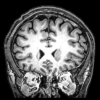I know my english is pathetic LOL but nobody is curious about this subject?? wowww
Piracetam in the treatment of schizophrenia: implications for the glutamate hypothesis of schizophrenia.
Noorbala AA, Akhondzadeh S, Davari-Ashtiani R, Amini-Nooshabadi H.
Roozbeh Psychiatric Hospital, Tehran University of Medical Sciences, Tehran, Iran.
OBJECTIVE: There is a growing interest in investigating the role of glutamate receptors in the pathophysiology of schizophrenia. Indeed, the hyperdopaminergic theory of schizophrenia can explain only the positive symptoms of schizophrenia, whereas the glutamate hypothesis may provide a more comprehensive view of the illness. We undertook a trial to investigate whether the combination of haloperidol with piracetam, a nootropic agent which modulates the glutamate receptor positively was more effective than haloperidol alone. METHODS: Thirty patients who met the DSM IV criteria for schizophrenia completed the study. Patients were allocated in a random fashion, 14 to haloperidol 30 mg/day plus piracetam 3200 mg/day and 16 to haloperidol 30 mg/day plus placebo. RESULTS: Although both protocols significantly decreased the score of the positive symptoms, the negative symptoms, the general psychopathological symptoms and the total score of PANSS scale over the trial period, the combination of haloperidol and piracetam showed a significant superiority over haloperidol alone in the treatment of schizophrenic patients. CONCLUSION: Piracetam, a member of the nootropic class of drugs and a positive modulator of glutamate receptor, may be of therapeutic benefit in treating schizophrenic patients in combination with typical neuroleptics. However, a larger study to confirm our results is warranted.
PMID: 10583700 [PubMed - indexed for MEDLINE]
Long-term potentiation depends on release of D-serine from astrocytes.
Henneberger C, Papouin T, Oliet SH, Rusakov DA.
UCL Institute of Neurology, University College London, London WC1N 3BG, UK.
Long-term potentiation (LTP) of synaptic transmission provides an experimental model for studying mechanisms of memory. The classical form of LTP relies on N-methyl-D-aspartate receptors (NMDARs), and it has been shown that astroglia can regulate their activation through Ca(2+)-dependent release of the NMDAR co-agonist D-serine. Release of D-serine from glia enables LTP in cultures and explains a correlation between glial coverage of synapses and LTP in the supraoptic nucleus. However, increases in Ca(2+) concentration in astroglia can also release other signalling molecules, most prominently glutamate, ATP and tumour necrosis factor-alpha, whereas neurons themselves can synthesize and supply D-serine. Furthermore, loading an astrocyte with exogenous Ca(2+) buffers does not suppress LTP in hippocampal area CA1 (refs 14-16), and the physiological relevance of experiments in cultures or strong exogenous stimuli applied to astrocytes has been questioned. The involvement of glia in LTP induction therefore remains controversial. Here we show that clamping internal Ca(2+) in individual CA1 astrocytes blocks LTP induction at nearby excitatory synapses by decreasing the occupancy of the NMDAR co-agonist sites. This LTP blockade can be reversed by exogenous D-serine or glycine, whereas depletion of D-serine or disruption of exocytosis in an individual astrocyte blocks local LTP. We therefore demonstrate that Ca(2+)-dependent release of D-serine from an astrocyte controls NMDAR-dependent plasticity in many thousands of excitatory synapses nearby.
PMID: 20075918 [PubMed - in process]
D-Serine and a glycine transporter inhibitor Sarcosine improve MK-801-induced cognitive deficits in a novel object recognition test in rats.
Karasawa J, Hashimoto K, Chaki S.
Discovery Pharmacology, Molecular Function and Pharmacology Laboratories, Taisho Pharmaceutical Co. Ltd., 1-403 Yoshino-cho, Kita-ku, Saitama 331-9530, Japan.
Compounds enhancing N-methyl-d-aspartate (NMDA) glutamate receptor function have been reported to improve cognitive deficits. Since cognitive deficits are considered to be the core symptom of schizophrenia, enhancing NMDA receptor function represents a promising approach to treating schizophrenia. In the present study, we investigated whether d-serine or a glycine transporter inhibitor N-[3-(4'-fluorophenyl)-3-(4'-phenylphenoxy)propyl]sarcosine (NFPS), both of which enhance NMDA receptor function, could improve MK-801-induced cognitive deficits in rats, and compared their effects with those of the atypical antipsychotic clozapine and of the typical antipsychotic haloperidol. To assess cognitive function, we used a novel object recognition test in rats that measured spontaneous exploratory activity of a novel object when paired with a familiar object. We then evaluated the effects of the compounds on cognitive deficits induced by treatment with MK-801, the NMDA receptor antagonist. Pretreatment with clozapine (1, 5 mg/kg, i.p.) but not haloperidol (0.03, 0.1 mg/kg, i.p.) significantly improved MK-801-induced cognitive deficits. Pretreatment with D-serine at 800 mg/kg (i.p.) or NFPS (0.3, 1 mg/kg, i.p.) significantly improved MK-801-induced cognitive deficits under this test paradigm. These findings suggest that impaired preference for novel objects induced by MK-801 in the novel object recognition test could be a useful animal model for evaluating the efficacy of compounds targeting the cognitive deficits observed in schizophrenic patients. The results also suggest that enhancing NMDA receptor function is an effective way for treating the cognitive deficits associated with schizophrenia.
PMID: 17854919 [PubMed - indexed for MEDLINE]
Edited by gwen, 08 February 2010 - 05:20 PM.



















































